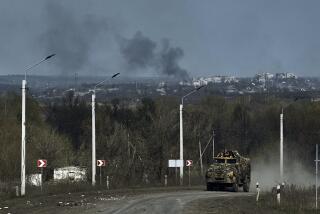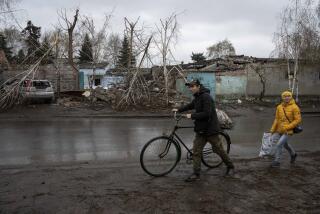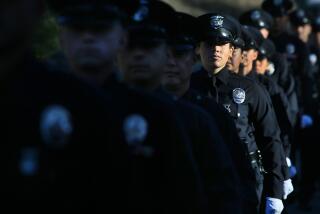New Data May Disclose POWs’ Fates
- Share via
WASHINGTON — Bush Administration officials said Tuesday that they believe thousands of photographs and documents discovered in Vietnamese military archives will resolve dozens--perhaps hundreds--of cases of American servicemen missing for as many as 25 years in Southeast Asia.
A day after Vietnam abruptly reversed a longstanding policy and offered to release records on missing and captured Americans from the Vietnam War, the Bush Administration promised families of the POWs and MIAs that they would soon be allowed to examine the documents and photographs.
While some of the documents have been in U.S. hands for several weeks, retired Gen. John W. Vessey Jr., President Bush’s special emissary for POW-MIA affairs, brought more Vietnamese records back with him when he returned to Washington on Tuesday evening from a weekend trip to Hanoi.
“We have brought home some very important documentation,” said Sen. John McCain (R-Ariz.), a former POW who accompanied Vessey. Confirming that the records include photographs of dead U.S. servicemen, McCain said that the newly obtained documents should “go a long way” toward resolving the POW-MIA issue and ending “this terrible nightmare for so many American families.”
However, the initial reaction from POW activist groups and family support organizations was subdued, a caution that appeared to reflect both past disappointments and concern by some that the focus of the POW-MIA accounting effort should be kept on the search for prisoners who many activists believe may still be alive in Indochina.
Among the documents in Vietnam’s archives, officials said, are photographs of Americans captured alive and of others who appear to be dead, but whose name tags or faces are clearly recognizable in the wreckage of downed planes. Some of the grisly photographs are of soldiers shot on the battlefield.
Although sources cautioned that many of the servicemen photographed alive are believed to have already been returned to the United States or are known to have died in captivity, other photos could document the deaths of servicemen whose status is unknown.
“We have high hopes and I think there’s a real possibility that at least some discrepancy cases will be resolved,” said one knowledgeable Bush Administration official. “We’ve long suspected these guys (the Vietnamese) were fairly systematic about their documentation. But they have never owned up to it until now.”
Word of the cache of documents came in a statement issued Monday in Hanoi acknowledging that “the government of Vietnam . . . has been conducting a countrywide search of all of its archives for documents, photographs and other material related to American POW-MIA cases and will make all such material available to the United States.”
The Vietnamese decision to turn over the documents concludes a fierce internal debate that has pitted political leaders in Hanoi against military officers and some diplomats.
But even as Vietnam’s military and diplomatic officials argued to reluctant political leaders that the Hanoi government should open its archives, lower-level Vietnamese officials recently have been funneling many documents to American representatives without Hanoi’s blessing.
Those documents, pored over intensely by American intelligence officials, made clear that the government of what was then North Vietnam had maintained meticulous documentation of American servicemen who were downed, captured or found dead in areas under the control of North Vietnamese forces.
In early October, as the evidence in U.S. hands mounted, Defense Secretary Dick Cheney asked Vietnamese Foreign Minister Nguyen Manh Cam to come to Washington for a meeting with him and Acting Secretary of State Lawrence S. Eagleburger.
A knowledgeable official said that Cheney confronted the Vietnamese official with documents in U.S. possession, whose existence Vietnam had long denied, and demanded that his government surrender more material.
Eagleburger was said to have pointedly reminded the official that any normalization of diplomatic relations with the United States, long sought by Hanoi, depends on Vietnam’s cooperation on the issue.
State Department officials cautioned Tuesday that while Vessey had made “important progress,” that progress did not meet the criteria set by the United States for such normalization.
The United States has not accounted for 2,266 American servicemen from the Vietnam War. Of those, 1,658 were lost in Vietnam, while the others disappeared in the neighboring countries of Cambodia and Laos.
One official said that the Defense Intelligence Agency is “working around the clock” to identify the bodies depicted in the photographs it has. The result, the official added, could be “a major breakthrough” in the long-stalled effort to account for those still officially listed as missing.
But another source familiar with the cache said that about 80% of the photographs appear to duplicate each other or photographs already in the hands of U.S. officials. The source cautioned against expectations that the new evidence would quickly resolve most of the still-unresolved cases. The presumption is that many of the photographs will prove to be of servicemen already listed as killed in action, he said.
“The key question is the extent to which these photos help to resolve the discrepancy cases. I would suspect that the vast majority of them will turn out to be KIAs (soldiers killed in action),” the source said. It may take “weeks or months” before that question can be answered, the source added.
A Defense Department official added that “those (documents and photographs) relevant to a particular family’s case . . . will be made available” to that family.
Word of the photographs prompted a flood of calls from family members to the Washington offices of the National League of Families of American Prisoners and Missing in Southeast Asia.
“Obviously, the families are anxious to hear if any of the photos correlate to their missing family members,” league spokeswoman Mary Backley said.
The muted reaction of many family groups appeared to reflect the possibility that many who have clung to hope will have to face new and perhaps definitive evidence that their loved ones did not survive their ordeals in Southeast Asia.
“There will be some very sorry but definitive evidence” contained in the documents, said one knowledgeable congressional source.
Times staff writer Matthew Marshall contributed to this article.
More to Read
Sign up for Essential California
The most important California stories and recommendations in your inbox every morning.
You may occasionally receive promotional content from the Los Angeles Times.











